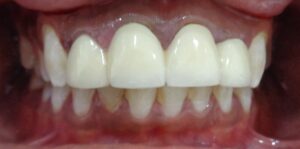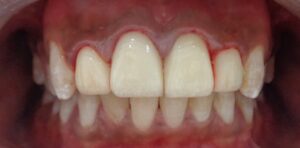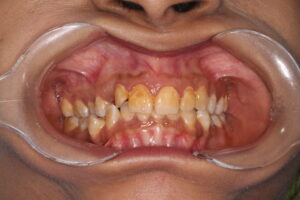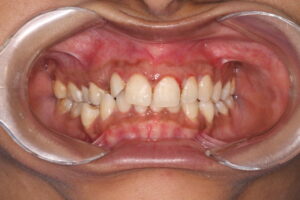Esthetic Dentistry
VENEERS
Dental Veneers are thin covers that adhere to teeth to give teeth a more classically shaped look. If you want to improve your smile, dental veneers are a simple option. Veneers are thin coverings that are placed over the front (visible) part of the tooth. They look like natural teeth. Veneers can be used to correct a wide range of dental issues, such as:
❖ Teeth that are stained and can’t be whitened by bleaching
❖ Chipped or worn teeth
❖ Crooked or misshapen teeth


RESIN INFILTRATION
Resin infiltration technique is a novel technology that bridges the gap between prevention and restoration of early decay and cancamouflage aesthetically disfiguring white spots and fluorosis stains.
This type of minimal intervention technology has the following advantages:
- Non-Invasive treatment, preserving tooth structure;
- Achieved in a single visit;
- Mechanical stabilization of demineralized enamel;
- Deeper penetration into porous demineralized areas;
- Arrest/retardation of lesion progress;
- Minimized risk of secondary decay
- No risk of postoperative sensitivity and pulpal inflammation;
- Reduced risk of gum and bone disease
- Improved esthetic outcome when used as a “masking” resin on demineralized labial surfaces (white spot lesions, i.e. with orthodontic patients);
- High patient acceptance.
TOOTH BLEACHING
Tooth Bleaching is the most common procedure in cosmetic dentistry. Bleaching of teeth is one of the most conservative and cost effective dental treatments for discoloured teeth than aggressive methods like veneering, crowning or bonding to enhance an individual smile. It is ideal for people who have healthy and unrestored teeth and gums. Tooth whitening cannot make a complete colour change but it may lighten the existing shade and is not permanent. Yellowish teeth respond well to bleaching compared to brownish coloured teeth. Gray/purple or tetracycline stains are more difficult to lighten and may require prolonged bleaching. The effect is less likely to last as long if you smoke, eat or drink products that stain your teeth. Teeth can turn yellow or become discoloured for a number of different reasons. Though age is a significant reason – smoking, certain foods, coffee, tea, antibiotics, etc, can also cause teeth to turn yellow. However, bleaching is a great way to turn stained and yellow teeth into sparkling white again.
Teeth Bleaching: Keeping Teeth White
It is a process wherein the dentist will brighten the colour of your teeth by removing traces of discolouration. There are two ways to undergo tooth bleaching – home bleaching and in-clinic bleaching (In-office bleaching).
- In-clinic Bleaching – A doctor performs in-office bleaching in a clinic with the aid of medical infrastructure.
- Home bleaching – Home bleaching can be done at home using trays made by the doctor or other methods.
Some bleaching options include:
❖ Whitening strips and gels
❖ Tray-based tooth bleaching system
❖ Tooth whitening toothpaste.


